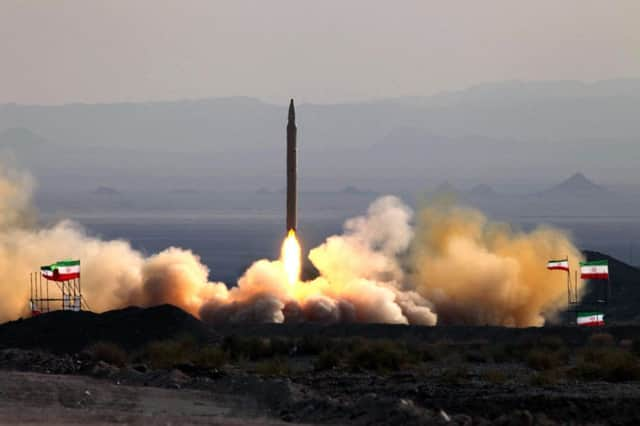Iran nuclear deadline extended


Six world powers want Iran to curb its nuclear programme in return for the lifting of sanctions. Tehran says it is not seeking nuclear weapons but wants atomic energy.
The six countries – the US, UK, Russia, China, France and Germany – have been in negotiations with Iran to finalise a preliminary deal reached last year in Geneva.
Advertisement
Hide AdAdvertisement
Hide AdYesterday it was announced negotiations would resume in December and would be extended until 30 June, 2015.
Iran will be allowed to continue accessing £450 million per month in frozen assets during that period.
Diplomats expect to reach a political agreement by 1 March, with the full technical details of the agreement being confirmed by 1 July.
Under the terms of inter- national treaties, countries have the right to develop nuclear energy, which Iran insists is its only aim.
However, the International Atomic Energy Agency says it has been unable to confirm Tehran’s assertions that its nuclear activities are exclusively for peaceful purposes.
Comments by key players in the talks suggested that not much was agreed on in Vienna beyond the decision to keep talking.
CONNECT WITH THE SCOTSMAN
• Subscribe to our daily newsletter (requires registration) and get the latest news, sport and business headlines delivered to your inbox every morning
The decision appears to benefit Iran. Its nuclear programme is left frozen but intact, without any of the cuts sought by the US.
Advertisement
Hide AdAdvertisement
Hide AdGerman foreign minister Frank-Walter Steinmeier said only differences about “technical details” remained.
But the length of the extension suggested that both sides felt plenty of time was required to overcome the disputes on how much Iran needed to restrict nuclear activities that could be used to make weapons in exchange for relief from sanctions imposed over its nuclear programme.
“All the people involved here feel that there really is a chance to find out a way to each other and we are going to take that chance,” Mr Steinmeier said about the decision to extend.
But obstacles far from the negotiating table could complicate the process.
Members of the new Republican-controlled US Congress that will be sworn in in January have already threatened to impose additional sanctions on Iran and may well have enough votes to overturn an expected veto of such legislation by president Barack Obama. New sanctions could very well derail the talks, as Iran has signalled they would be a deal breaker.
In Tehran, hardliners fearful their country could give away more than it gets under any final deal could increase pressure on Supreme Leader Ayatollah Ali Khamenei to break off the talks. The extension, however, appears to have his approval.
The United Nations Security Council has adopted six resolutions since 2006 requiring Iran to stop enriching uranium, with sanctions to persuade Tehran to comply.
The US and EU have imposed additional sanctions on Iranian oil exports and banks since 2012, hitting Iran’s oil revenue badly.
Advertisement
Hide AdAdvertisement
Hide AdMr Obama has acknowledged “significant” gaps between the two sides remained, and that Iran’s president, Hassan Rouhani, had “to deal with his politics at home”. “He’s not the ultimate decider inside of Iran, the Supreme Leader [Ayatollah Ali Khamenei] is,” Mr Obama said.
Israeli prime minister Benjamin Netanyahu, whose country has not ruled out bombing Iran’s nuclear facilities, told the BBC that “no deal is better than a bad deal”.
SCOTSMAN TABLET AND IPHONE APPS